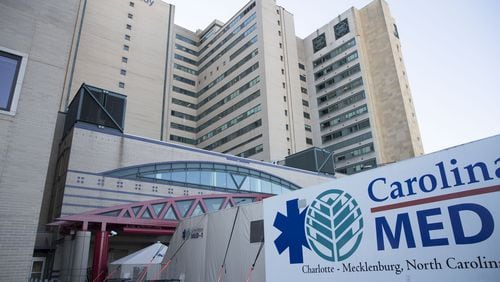A six-week stopgap spending bill the U.S. House of Representatives advanced Tuesday evening includes funding desperately sought by Georgia’s safety-net hospitals and community health centers.
The additional money could be OK’d by the end of the week for the federal program that pays the likes of Grady Memorial Hospital, but a broader political stalemate over overall spending levels and immigration threatens to complicate or even delay that timeline.
The House Republican authors of the so-called continuing resolution included funding for several broadly popular yet expired health care programs in order to lure Democratic support. The gambit didn’t work — only 17 Democrats, including U.S. Rep. Sanford Bishop of Albany, ended up backing the bill — but it was enough to send the measure to the Senate, which is expected to alter the measure before Thursday, when current federal funding expires.
The legislation, which the House passed by a vote of 245-182, includes two years of full funding for community health centers such as Atlanta-based Mercy Care. It would also ward off two years of planned funding cuts to the Disproportionate Share Hospital program, or DSH, which provides grants to hospitals that treat a larger share of indigent patients such as Grady, the Atlanta Medical Center and Emory University Hospital.
Both programs' authorizations expired on Oct. 1 of last year after Congress failed to act in time. Lawmakers had spent the weeks ahead of the deadline consumed in debate over the future of Obamacare.
Democrats are broadly supportive of the DSH and community health programs, but their party leaders are waging a larger battle with their Republican counterparts over overall spending levels for federal nondefense programs and immigration. They say the GOP has been using the health programs as political pawns to get their way on lower funding for nondefense programs.
“It’s a really cynical attempt to distract Americans from the fact that they are systematically undermining the social safety net,” U.S. Rep. Hank Johnson, D-Lithonia, said Tuesday.
Republicans say Democrats have been responsible for the delay. They point to their opponents’ rejection of a stand-alone bill reauthorizing the programs last year. (Democrats said the offsets in funding were unacceptable since they would have hurt Obamacare.)
“Really, it’s become a discussion here about governance and moving things that frankly our friends across the aisle have always said they wanted to do,” said U.S. Rep. Doug Collins, R-Gainesville. Democrats, he said, “are willingly voting no because of a partisan-blinded agenda.”
Hospitals lobbied hard
Nearly drowned out in the political shuffle has been the hospitals themselves.
Trade groups and local health centers have waged a tooth-and-nail lobbying campaign in recent months petitioning Congress for the additional money.
Community health centers have warned they may need to close or lay off staff, particularly in already short-handed rural areas, if Congress doesn’t reauthorize the program.
Grady had warned that without Congress stepping in to stop the previously planned DSH cuts, it would see $49 million less in the first year, expanding to well over $100 million by 2025. It began seeing the impact of Capitol Hill's inaction earlier this winter after the hospital's grant amount was reduced.
Hospitals hope the program money will be back-filled this spring after Congress approves fresh funding in the stopgap spending bill.
“Passage of the resolution will allow us to continue to provide needed services for the underserved,” said Matthew Hicks, senior vice president at Grady Health System.
The issues, however, are not permanently resolved. Congress will need to act before October 2019 to ward off the next round of cuts to the indigent care program. That’s also when fresh funding will be needed for community health centers and several other popular health programs.
Georgia Republican U.S. Sen. Johnny Isakson, who has pushed for more program funding in recent months, said political support for such health care facilities is still there on Capitol Hill. But he lamented that such programs — as well as Pentagon funding — have ended up becoming “collateral damage” in the larger budget wars.
“I think we’re getting close to having a deal (in which) we can make the best of a bad situation,” he said in an interview Tuesday.
Stopgaps, he said, “are not the way to run and fund the government … but I also don’t take my marbles and go home if you don’t play the way I want you to play.”
The short-term bill did give Isakson two other political victories. The measure included the text of two bipartisan health care bills he helped champion, including one designed to help Medicare patients living with chronic illnesses and another expanding a federal program for patients receiving intravenous medication at home instead of the hospital.
Never miss a minute of what's happening in Georgia Politics. Subscribe to PoliticallyGeorgia.com.









